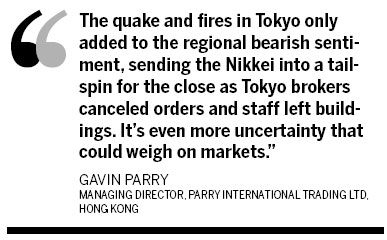Money
Japan quake, Middle East unrest hit shares across Asia
By Anna Kitanaka (China Daily)
Updated: 2011-03-14 11:06
 |
Large Medium Small |
TOKYO - Asian stocks fell last week, dragging down a regional benchmark index by the most since August, as conflict escalated in the Middle East and an earthquake shook Japan in the final minutes of trading on Friday.

Chiyoda Corp, a Japanese contractor that gets almost half of its sales from the Middle East, sank 6.2 percent last week in Tokyo. Air China Ltd, the nation's No 1 international carrier, lost 2.8 percent in Hong Kong. BHP Billiton Ltd, the world's biggest mining company, dropped 6.5 percent in Sydney. Tokio Marine Holdings Inc, Japan's second-largest casualty insurer, retreated 7.6 percent.
"The quake and fires in Tokyo only added to the regional bearish sentiment, sending the Nikkei into a tailspin for the close as Tokyo brokers canceled orders and staff left buildings," said Gavin Parry, managing director of Parry International Trading Ltd in Hong Kong. "It's even more uncertainty that could weigh on markets."
The MSCI Asia Pacific Index fell 3.1 percent to 135.03 last week, its biggest drop since the week ending Aug 13. The gauge rose 1.9 percent last week as better-than-estimated economic data from South Korea to the US eased concern about surging oil prices following tension in North Africa and the Middle East. Japan's Nikkei 225 Stock Average fell 4.1 percent last week, extending declines in the final 14 minutes of trading following the 8.9-magnitude earthquake that struck at 2:46 pm local time on Friday. Australia's S&P/ASX 200 Index dropped 4.5 percent, Hong Kong's Hang Seng Index slipped 0.7 percent and China's Shanghai Composite Index lost 0.3 percent. South Korea's Kospi Index declined 2.5 percent.
Chiyoda fell 6.2 percent to 685 yen ($8.29). JGC Corp, a competitor that gets 34 percent of sales from the Middle East, dropped 6.5 percent to 1,759 yen. Daewoo Engineering & Construction Co, which gets 27 percent of sales in Africa and the Middle East, retreated 3 percent to 11,200 won ($10.08) in Seoul.
Oil surged above $105 a barrel last week as Libyan leader Muammar Gadhafi's forces escalated a war against rebels last week, carrying out air and artillery strikes. Government forces drove rebels from the Mediterranean oil hub of Ras Lanuf after Gadhafi's son pledged to mount a full-scale attack against an uprising that has split the country.
Air China lost 2.8 percent to HK$7.23 (93 cents) in Hong Kong. All Nippon Airways Co, Asia's largest listed carrier by sales, declined 1.4 percent to 281 yen in Tokyo, even after President Shinichiro Ito said the company had hedged 85 percent of its fuel needs for the current fiscal year. BHP Billiton declined 6.5 percent to A$44.19 ($44.51) in Sydney.
Japanese shares extended losses following the earthquake that struck northeast of Tokyo. Tokio Marine fell 7.6 percent to 2,512 yen. Toyota Motor Corp lost 5 percent to 3,595 yen. Fanuc Corp sank 4.7 percent to 12,350 yen. The MSCI Asia Pacific Index has almost doubled in the past two years. Shares in the index traded at 13.6 times estimated earnings on average at Friday's close of trading in Asia, the lowest since September.
Bloomberg News
| 分享按钮 |



